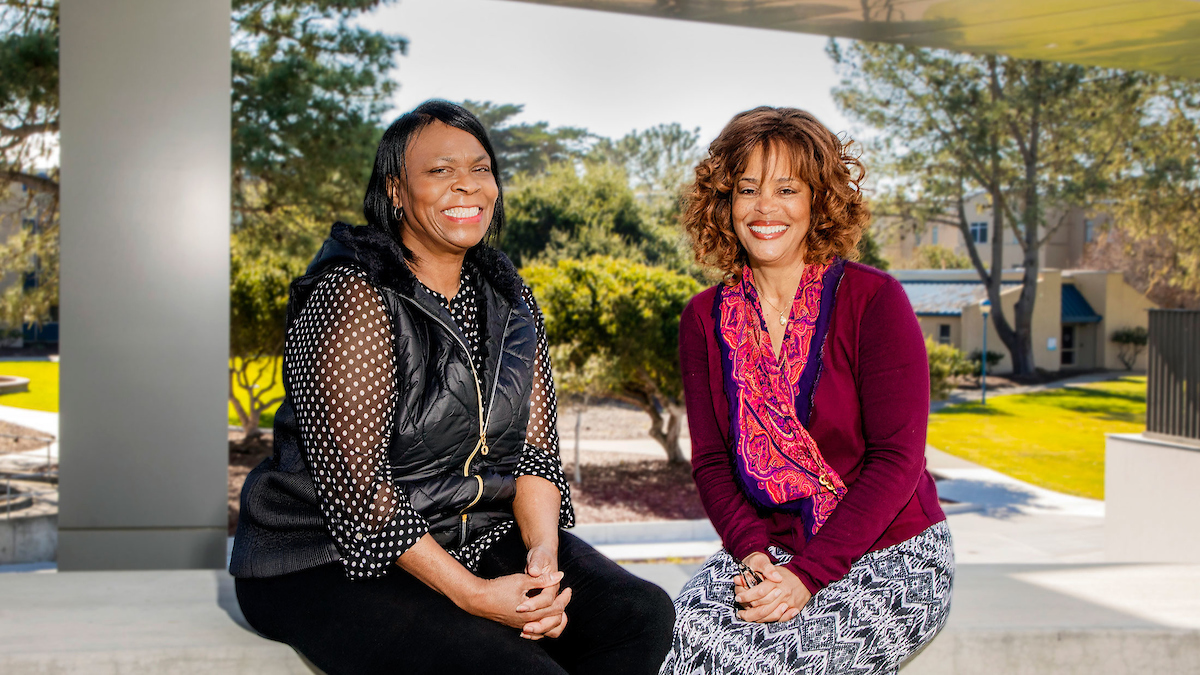Support for Black students extends beyond Black History Month

Vivian Waldrup-Patterson and Rhonda Mercadal-Evans | Photo by Brent Dundore-Arias
February 11, 2022
CSUMB’s “Strength Through Diversity” awareness campaign aims to build on our ongoing commitment to inclusive excellence. Stories, social media posts, and special events throughout the academic year will celebrate diversity and highlight the many identity groups represented by the students, faculty, staff, and alumni that make up the CSUMB community. February is Black History Month.
By Walter Ryce
When Fort Ord was closed in 1994 by order of Congress’ Base Realignment and Closure (BRAC) action, it began an exodus of Black soldiers, their families, and extended families from the area — particularly Seaside. As the Black population has declined, there’s been an influx in people of Mexican, Central American, Anglo, Asian and Pacific Islander heritage.
The shift in the ethnic demographics and cultural character of the region has supplanted some of the historic Black presence. So at CSUMB, a number of support services, groups and events have been formed in order to reconstitute some of that community and help Black students and faculty feel embraced.
One of the longest-running is the African Heritage Faculty and Staff Alliance (AHFSA), an employee affinity group that was formed in 2009 and currently has about 30 members.
The cross-functional group of professionals support each other and Black students, meeting monthly to check in, address campus issues, and celebrate successes.
The group had a special meeting on Jan. 28 with President Ochoa, ahead of his retirement, to talk about ensuring inclusiveness after his term, address recent concerns, and to express mutual appreciation for a shared history of dialogue.
The monthly AHFSA meetings are co-chaired by Vivian Waldrup-Patterson and Rhonda Mercadal-Evans.
“The Alliance serves as an advocate, support system, and resource group for Black faculty and staff as we strive toward inclusive excellence in the CSUMB community,” said Mercadal-Evans.
She is the associate director of the Center for Advising, Career and Student Success, and advocates that students consult their academic and career advisors, encourages them to join clubs and organizations, and talks about internships, research opportunities and graduate school.
She says that the efforts to help Black students succeed are amplified by the work of other groups on campus.
“This level of connecting, supporting, and problem solving together enables everyone to feel a sense of support that may not naturally be present at a campus that is so busy, growing, and evolving like CSUMB,” said Waldrup-Patterson, interim director of the Center for Teaching, Learning and Assessment.
Some of the support services, groups and events revolving around Black life on campus include:
Super Saturday An annual statewide community recruitment event in which campus officials visit Black churches to increase college enrollment by young Black people. This year it is virtual, 10 - 11:30am Saturday, Feb. 12.
UMOJA A support group, nested within the Personal Growth and Counseling Center and modeled on an African Maasai village, for Black students to receive mentoring, normalize culturally competent mental health counseling, and reinforce a sense of belonging.
Center for Black Student Success Aids recruitment and retention of Black students by providing services, resources, collaborations, outreach and events. “I see the CBSS, as well as the AHFSA, as being central to developing community for its members,” said Brian Corpening, associate vice president for Inclusive Excellence and Sustainability and chief diversity officer.
All Black Gala A formal annual gathering that celebrates Black history, fosters belonging, cultivates community, and has brought speakers including Angela Davis, Shaun King, Kevin Willmott and others. This year it takes place 7pm Saturday, Feb. 26, honors community members such as Helen Rucker, and will reveal a secret announcement.
Mandla Mentoring The African Heritage Faculty and Staff Alliance offers students small-group mentoring and networking to foster an immediate sense of belonging, connection to peers, guidance to navigate campus resources, and problem-solving support to stay the course and achieve academic success through graduation.
African Heritage Research Collaborative Addresses issues of engagement, retention, and graduation numbers among Black students on campus by engaging students in the research process through collaboration, and bringing valuable knowledge from the past and applies it to the present. Students from all racial and ethnic backgrounds are invited to join.
Africana Heritage Scholars Living Learning Program Kyle Amore, senior coordinator of Residential Academic Initiatives, describes this as a program in which any student who wants to “participate in a tight-knit living community specifically focused on the Black and African student experience at CSUMB” can live and interact together in a residence hall, and share cultural heritage.